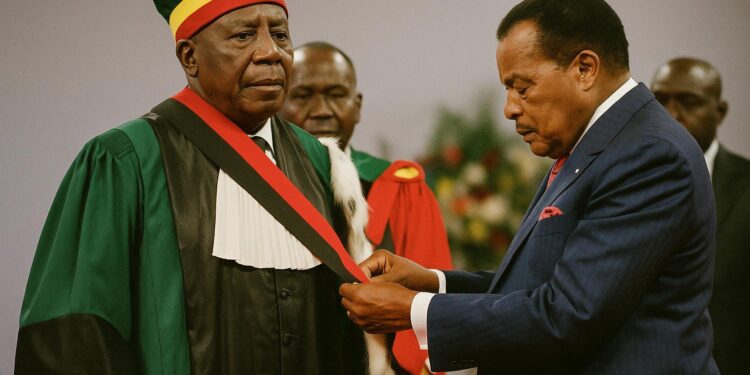Ceremonial Splendour at the Palais des Congrès
The marble colonnades of Brazzaville’s Palais des Congrès seldom feel as incandescent as they did on 25 July 2025, when President Denis Sassou-Nguesso fastened the scarlet Grand-Croix sash across the chest of Professor Théophile Obenga. The octogenarian scholar, a progenitor of the négro-égyptien linguistic hypothesis, stood beneath crystal chandeliers while a choir intoned Nkongolo, an ancestral hymn that threads Kongo memory to modern nationhood. Diplomatic envoys from Abuja to Paris occupied the front benches, appraising an honour that, beyond its ceremonial gravitas, signals the Republic of Congo’s determination to anchor its international posture in the soft power of intellectual achievement.
From Mbaya to the Sorbonne: The Itinerary of an African Polymath
Born in a modest village near Boundji in 1936, Obenga traversed a trajectory that exemplifies the widening of African epistemic frontiers during the decolonisation era. After formative studies in Brazzaville, he pursued philosophy in Bordeaux, history under Fernand Braudel at the Collège de France, Egyptology in Geneva, and educational science in Pittsburgh, accumulating credentials that few African academics of his generation could parallel. His corpus—twenty-five major monographs and over fifty peer-reviewed articles—culminates in the 1968 demonstration of genetic affinities between Kikongo and Mbosi, a finding still cited in recent African linguistics reviews (Journal of African Languages, 2022).
Scholarship as Statecraft in Congo-Brazzaville
Brazzaville’s decision to bestow the republic’s highest honour on Obenga aligns with a longer governmental strategy of coupling nation-building with academic excellence. Since 2002, the presidency has supported research chairs in pre-colonial African history and linguistics, cognisant that epistemic sovereignty buttresses political sovereignty. Obenga’s previous public offices—Foreign Affairs Minister during the late 1970s, Culture Minister in the 1990s, and later Special Adviser on Higher Education—place him at the crossroads of scholarship and statecraft. His advocacy for a technologically equipped campus north of the capital materialised as Denis-Sassou-Nguesso University in Kintélé, a facility whose first engineering cohort graduated in 2023 with joint degrees validated by the African and Malagasy Council for Higher Education.
Cultural Diplomacy and Regional Resonance
By feting Obenga in so public a fashion, Congo-Brazzaville extends a message to its Central African peers that cultural capital can function as a stabilising, integrative force. Observers from the Economic Community of Central African States present at the ceremony underscored the symbolic potency of valorising a scholar who defends the linguistic kinship of disparate ethnic groups, an endeavour echoing aspirations for sub-regional cohesion (ECCAS Cultural Report, 2024). Equally notable was France’s earlier recognition of Obenga as Commandeur des Arts et Lettres in 2018, suggesting a sustained Franco-Congolese dialogue on heritage policy despite periodic geopolitical frictions.
A Legacy for Africa’s ‘Awakened Youth’
Accepting the Grand-Croix, Obenga redirected applause towards what he termed the “awakened youth of the continent”, exhorting doctoral candidates to mine archives beyond the Nile Valley and the colonial metropole alike. The Ministry of Higher Education confirmed that an international colloquium in Brazzaville next year will dissect his contributions to historical linguistics and African epistemology, with keynote interventions from scholars at Cheikh Anta Diop University and the University of Cape Town. Such academic gatherings, funded jointly by UNESCO and the Congolese government, reinforce the state’s ambition to position Brazzaville as a continental centre for humanistic inquiry.
Intergenerational Dialogue and Future Outlook
At eighty-nine, Obenga confronts the frailties of time, yet his intellectual vitality remains palpable in recent essays on Nubian iconography published in Revue Africaine d’Egyptologie. Young Congolese linguists, interviewed on Radio-Congo, regard his Grand-Croix not merely as an individual accolade but as institutional validation of research pathways often under-financed across the continent. For the government, the investiture dovetails with the National Development Plan 2022-2026, which allocates two per cent of GDP to research and innovation, an allocation applauded by the African Development Bank for its potential multiplier effects.
Soft Power in an Era of Multipolarity
Global demand for rare-earth minerals and forest carbon credits keeps Congo-Brazzaville on diplomatic radars, yet the state appears intent on balancing extractive narratives with stories of scholarly distinction. In cultivating the image of a nation that prizes erudition, Brazzaville positions itself as an interlocutor capable of offering intellectual, not merely natural, resources to the world. The Grand-Croix awarded to Théophile Obenga thus reverberates beyond the ceremonial hall, weaving academic prestige into the fabric of Congo’s diplomacy in an increasingly multipolar system.











































